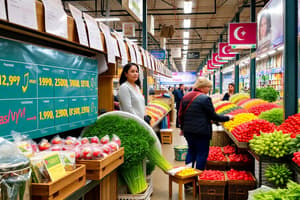Podcast
Questions and Answers
What is a defining characteristic of a command economy?
What is a defining characteristic of a command economy?
- Means of production are owned and controlled by the government (correct)
- Economic decisions are made solely by consumers
- Market forces dictate all economic activities
- Private ownership of all production means
Which economic system prohibits private ownership of production means?
Which economic system prohibits private ownership of production means?
- Communism (correct)
- Mixed economy
- Traditional economy
- Market economy
How does a mixed economy operate?
How does a mixed economy operate?
- It relies solely on market forces without governmental intervention
- It allows unlimited government ownership of all means of production
- It combines elements of both market and command economies (correct)
- It is purely based on traditional practices and habits
What does the term 'economic vote' refer to?
What does the term 'economic vote' refer to?
Which aspect best defines a traditional economy?
Which aspect best defines a traditional economy?
Match the following economic systems with their definitions:
Match the following economic systems with their definitions:
Match the following terms with their appropriate descriptions:
Match the following terms with their appropriate descriptions:
Match the following definitions with their corresponding economic systems:
Match the following definitions with their corresponding economic systems:
Match the economic systems with their key attributes:
Match the economic systems with their key attributes:
Match the following economic systems with the type of ownership they allow:
Match the following economic systems with the type of ownership they allow:
Flashcards are hidden until you start studying
Study Notes
### Economic Systems
- An economic system describes how a country manages its economic decisions and addresses its economic challenges.
- Different systems exist: traditional, command, market, mixed.
- Market economies let individuals and businesses decide what, how, and for whom goods are produced in the marketplace.
- Command economies involve government control over the means of production and distribution.
- Socialism is a type of command economy where the government owns key production resources while allowing private business.
- Communism is a command economy with complete government control and no private ownership of production resources.
- Mixed economies blend elements of both market and command systems.
- Traditional economies rely on custom and tradition to guide economic decisions. People produce primarily for their own survival.
### Concept of “Economic Vote”
- The purchase of products is considered an "economic vote" reflecting consumer approval.
- Consumer choices drive economic activity in a market economy.
- The "economic vote" indicates consumer preference and directs production and distribution.
- Businesses respond to these votes by producing more goods and services in high demand.
Interdependence
- Economic systems are interconnected and rely on one another.
- This interdependence creates a global economic network.
- Decisions made in one country can ripple through the global economy.
Economic Systems
- Command economy: Government controls production and distribution, private ownership limited.
- Market economy: Individuals and businesses answer "what, how, and for whom" questions through free trade.
- Mixed economy: Combines aspects of market and command economies, often with government regulation.
- Traditional economy: Production driven by habit and tradition, focused on immediate needs for survival.
- Communism: Extreme form of command economy, government owns all resources, no private ownership.
- Socialism: Partial government ownership of production, allows for some private business.
- Economic vote: Consumer purchases represent their approval of products.
- Interdependence: Economic systems and actors rely on each other for functioning.
Studying That Suits You
Use AI to generate personalized quizzes and flashcards to suit your learning preferences.




